- Home
- Jane Smiley
The Greenlanders Page 51
The Greenlanders Read online
Page 51
Gunnars Stead stood empty for these three years, and every year, Thorkel Gellison came to Gunnar and attempted to persuade him to return to the steading, but every year Gunnar shrugged and declared that he had not thought about it. In fact, however, he knew that Birgitta was much opposed to such a move, and though he longed for it himself, he hesitated to force it upon her. The case was that her strength and her spirits did not seem to recover from the hunger as those of the others did. She could barely tolerate the light and the play of breezes outside the steading, and so she stayed within her bedcloset most of the time, and her limbs never regained the plumpness they had had, nor the strength. Nevertheless, she made room in her bedcloset for Gunnar now, and greeted him pleasantly each night, with caresses and questions about his activities. As she had once held and gazed upon the hands of her babies, or their toes or their knees, now she was pleased by Gunnar’s strength and firmness of flesh, and especially at the warmth he radiated, which was the warmth that had kept Death off her when he came seeking her at the end of the hunger. It seemed to her that she had seen him himself, and he had not been a large man with a white face, dressed in black, as the tapestries in the cathedral showed him to be, but instead Death was a white, shaggy, bearlike fellow with huge hands like paws and nails like curved claws that raked away one’s garments, one’s skin, one’s life. In fact, it seemed to Birgitta that, like others, she too had learned something, and that was that the Greenland wastes was where Death had his home, and he was the more ready to come among the Greenlanders because of proximity. The image of his claws reaching around Gunnar, groping after her, was one that she could not escape, and it did not seem to her that such a beast would be gathering her into the pleasant home of her eternal life, as priests said. Besides, the new priest, Eindridi Andresson, who came to St. Birgitta’s at the prescribed times and was rumored to be a nephew of Sira Audun, said that Hell was seven times bigger than Heaven, because for every soul that God took to himself, the Devil took seven. He also said of himself that it was his intention to harry the Greenlanders into the knowledge of God, not to cajole them into it. God was not as a mother, who holds out a bit of chewed meat so that the baby will toddle away from the open fire, but as a father, who chastens the child with blows so that it will know that the fire is painful. Eindridi Andresson was not a comforting priest, but most folk said that they had been comforted too long, lulled into sin, perhaps, which was why they had been punished. Others did not agree with this view.
It was Helga who took up her mother’s interests in the sheep, for she was not unlike Birgitta in her ways, although she was much more like Gunnar in her looks. In addition to this, Johanna returned from Hestur Stead, and most of the inside work fell to her. It had been Gunnar’s hope that Johanna and Helga would be friends and companions to each other, but they diverged so in temperament and interests that it was almost as though they were unrelated to one another. They did not even know enough of each other to quarrel, but were entirely indifferent.
Indeed, Gunnar, who had gotten quite used to Helga’s ways about the steading, which were like Birgitta’s, hardly knew what to do with Johanna, who went about behind him, picking up his tools and arranging them, picking up his socks and folding them together, putting everything out of the way before it was even in the way. After his meals, she whisked away the trencher or the bowl before he had pushed it from him, and he often had the feeling that there might be something left in it, although if he asked for it back, there never was. These were Jona’s ways, for Jona had a great reputation as a neat and tidy wife.
Johanna was still of an observing turn of mind, and Gunnar often found her gazing at him. Nor did she look away confused when he met her gaze, but only smiled and went about her business as if she’d done with looking at him. She was impartial about this steady, inquisitive gaze, bestowing it upon everyone, Kollgrim, Helga, Gunnar, the shepherds, the sheep, visitors, neighbors, the water of the fjord, the sky, the grass, the drying racks with their burden of reindeer meat and whale meat. She gazed at Gunnar’s writing so fixedly that he thought she must have learned to read, although the folk at Hestur Stead were not the reading sort. He asked her if she understood what the writing said. She smiled and shook her head, and said only that the patterns of the strokes set her to thinking. Gunnar read aloud what he had written:
“In these years, the farmers of Herjolfsnes were cut off more and more from the rest of the Greenlanders, but Snaebjorn Bjarnarson and the other principal landowners of the district refused to abandon their steadings and take up available steadings farther to the north.”
“You are writing of the Greenlanders, then,” said Johanna. “It seemed to me that you would be putting down tales such as those you relate to us in the evenings.”
“I would not be sorry to do that, but indeed, the pen goes so slowly that as I make the words, first I lose the thread of the tale, and then I lose the pleasure of the telling. Those tales are meant for speaking, perhaps, while these duller things are meant for writing down.”
“This must be like making cheese. What is made in a day is eaten in a moment.”
Such observations Gunnar found congenial and even amusing, but only he knew how to listen for them. Most often, when Johanna said something of this sort, Helga and Kollgrim, when he was about, looked puzzled and said nothing. Kollgrim had taken Finn’s place as the household’s representative to the year’s hunts, and in addition to this, he often went off by himself, after birds or hares or foxes, and his skills were good enough. Folk praised them and said that Kollgrim had recovered well from both his dunking and his peculiar nature as a child. Even so, Gunnar saw that confusion still sometimes overtook him, from his dunking, and an imp still looked out of his eyes once in a while, as if calculating the possibilities for mischief. Whatever Kollgrim had learned, though, and however they depended upon him for game and whalemeat, it was obvious to Gunnar that he was not yet the hunter that Hauk Gunnarsson had been, or Finn Thormodsson. No Greenlander was, anymore, just as no Greenlander had the wit to write down the tales folk knew, as they had once written down the tale of Atli, in verse, or the tale of Einar Sokkason and Bishop Arnald. When he suggested these things, Helga and Kollgrim smiled as if he were only an old man taking all virtue for the folk of his youth, but Birgitta knew that he was not mistaken, and said further that it was well for the Greenlanders that they knew not fully how things had declined for them since the days of their great-grandfathers, when men had had time enough and pleasure enough to build such a church as St. Birgitta’s, for example, with its arched window and fine glass brought from Bergen.
It was difficult not to be fond of Helga and not to enjoy her company, for she was affectionate and merry, and stubborn on only one subject, and that was the subject of marriage. Each year Gunnar took her to the Thing, and each year it was as if she had become a different person. She kept her eyes cast down, and spoke soberly and obediently to him in every particular. He went out among the other booths and sought for likely husbands, and when he saw a man who was well enough looking and found out about him that he had a good farm and some cows left and a boat, he would bring the fellow and his kinsmen back to his booth. There he would find Helga going solemnly about her business, and he would introduce the fellow, and Helga would raise her eyes to his face, and look at him squarely for a long moment—and then she would lower her eyes and say for the tenth or the hundredth time that she would do as he wished. And then he would look at the fellow again, and the fellow himself would be as if transformed. Gunnar would notice that he was slope-shouldered, or had a squint in one eye, or that even if he was prepossessing enough, his nearest kinsmen looked low and cruel, or simpleminded. And so he would make excuses for her and she would go unmarried for another year. She was twenty-seven winters old, seven or eight winters older than most newly married women, older than Margret when she married Olaf. A dangerous age, Birgitta dared to say. These days Birgitta dared to say many things, and Gunnar cared little, for he was much ple
ased to have saved her, and it seemed to him that nothing could ever again rob him of that pleasure. They were old folk now, and ready to die, he told her. None too soon, was what she replied. But she did not mean what she said, and wanted with all her heart to hide from the furry claws of Death for as long as possible. At any rate, while all about them, folk of every age were rushing to replace their lost mates or lost children, whether the priest was called in or not, Helga turned a cool eye on all such proceedings.
Now it happened one day that Kollgrim intended to snare ptarmigan in the hills above Vatna Hverfi, and he came to Helga and asked if she wished to go along with him, for he had something to show her. Occasionally she did go with him, for she had delicate fingers and was good at tying snares, and the two of them, not so far apart in age, were good friends. She agreed to go, and they set out early the next morning, hiking through the valley that opened upon Einars Fjord across from Hestur Stead, then getting into the boat that Kollgrim kept moored there, and rowing to the sand flats around Undir Hofdi church. Here they got out and pulled the boat onto the strand. Helga could not remember anything of Vatna Hverfi district, and she was much delighted by its pleasant aspect, for the land there is greener than elsewhere in Greenland, and the meadows and fields wider and more fertile. They went into the mountains above the church and snared many birds, and after a while the dusk came on, and Kollgrim led Helga down past the church and around the hillside to Gunnars Stead.
The steading was still in good repair, for Vigdis had reset the turves in the summer before her death. Kollgrim pushed open the door, and they entered the large and comfortable main room of the steading. Helga asked where they were. “It is an abandoned farm. I will tell you about it in the morning, when I am not so fatigued.” At this, he climbed into one of the bedclosets, and Helga climbed in after him, and they lay all night. Helga went quickly to sleep, and woke up only once during the night, but she did notice when she awakened that Kollgrim, for all that he complained of fatigue, was restless and lay with his eyes open. Then she went back to sleep. In the morning, she roasted two of the ptarmigan over a fire he made in the hearth, and commented upon how comfortable the steading was, and how little the hearth smoked. Now Kollgrim said, “This steading is our steading, and only the obstinacy of our father prevents us from laying claim to it. He may indeed wish to keep Birgitta at Lavrans Stead where she is happy recalling her mother and father, but we could live here as brother and sister, as our father and our father’s sister did many years ago.”
“Have you spoken to him of this?”
“I wished to see if we could sleep here comfortably first.”
“It seemed to me that I slept here more comfortably than you did last night.”
“You heard nothing then? Felt nothing?”
“Nay. I slept very well.”
“Then it may be that Vigdis is elsewhere, or that her ghost has not laid claim to the steading, for it was here that she was murdered by Ofeig.”
“You have done me an ill turn to bring my soul into such danger,” said Helga.
“But it has not turned out to be dangerous. In addition to that, I have slept here seven times now, and have never heard a sound nor felt a thing. Anyway, they say that her son had priests in the place shortly afterward, and that they have purged the spirits.” And so they looked about the steading, at the buildings and the furniture and the stalls of the byre, and they saw that all of these things were much finer and more conveniently made than they were at Lavrans Stead, and Kollgrim saw that the greed for such a life as one might live on such a fine steading was rising in Helga as it had risen in him. Helga found herself reluctant to leave, although the day was drawing on. They were standing in the byre remarking at the numbers of cows that had once been wintered there, when a figure appeared in the doorway, and startled them.
Kollgrim glanced up, and then glanced away, and stood as still as a post. Helga put her hand upon his shoulder, and felt that it was trembling, but then he shook her off and seemed to come to himself. He called out, “We are but looking over the abandoned steading. We have stolen nothing and mean no harm.” The figure stepped out of the doorway and disappeared, and Helga said, “I do fear to go out and gaze upon this spirit. They say that such things are so horrible that they enter one’s dreams forever afterward.”
“Nay, it is no spirit, but it is an enemy nonetheless. It is Jon Andres Erlendsson. We must not skulk about, but must go forth boldly if we intend to be his neighbors.”
“Perhaps such enmity is good reason for not being neighbors. If he strikes such confusion and fear into you—”
Kollgrim flared up. “Speak not of that again! Jon Andres Erlendsson is but a man, and neither as tall nor as broad as I am. Without Ofeig and his other accomplices he is nothing.”
“Then what is stopping us from going out?”
“Nothing.” But still he waited a moment before taking her hand and pulling her toward the entrance.
Jon Andres was sitting on the slope in front of the byre with his back to them, watching his horse crop the grass in the homefield a little ways off. He turned and looked upon them, and Helga, like everyone who had ever seen him, noticed his handsome looks and graceful manner. He said, “I was passing and I saw your belongings in front of the house. The steading is indeed abandoned, and therefore no more a concern of mine, but I do not wish its furnishings to be destroyed or stolen. You may look about as you wish.”
Helga replied, “I am Helga Gunnarsdottir, and although I was born here, it is entirely new to me, and of great interest.”
“I know who you are. I saw you from afar when I was carrying game and sheep to your father’s steading some years ago.”
Kollgrim flushed angrily and gripped Helga’s hand so that it hurt, but said nothing. Helga said, “We had intended to make our way back to Lavrans Stead this evening, and as it is a long journey, we had better be off.”
“Will you take meat with me at Ketils Stead? It is not far.”
Now Kollgrim was gripping her hand so tightly that it was only with difficulty that she didn’t cry out. “Nay,” she said, “we must not take the time, but you are kind to invite us.” Jon Andres nodded his head, and called his horse to him and mounted the beast. Only when he had ridden off did Kollgrim relax his grip. Helga turned upon him. “Now you have nearly broken my hand!” she exclaimed angrily. “And met his courtesy with rude silence! If you are so tall and so broad and so unafraid, then why have you let a woman speak for you?”
But Kollgrim, too, was angry. “I see that your eyes leapt to his quick enough, and your cheeks flushed when you talked to him! He is my bitter enemy, and he paid a compensation that was insultingly low for the injury he did to me!”
“It is you who has brought me here! If he is your bitter enemy, then it were best that you did not live cheek by jowl with him. But I can see in your eyes that such proximity is part of the attraction of this steading for you! Always it has been the case that you cannot bear not to look upon the trouble that you could avoid if you would. You would rather tease it toward you. I will not help you persuade father to claim this steading.”
“Will you talk against me?”
She had never denied him anything, since she was but a toddling child and he cradled among the furs of their mother’s bedcloset. They walked to the boat, and pushed it off the strand and got in. He rowed with great energy and a practiced, easy motion. She looked upon him, and finally said, “Nay, I will not talk against you, but I will pray against you.”
Kollgrim smiled.
Against this scheme, Gunnar raised many unanswerable objections. There were neither servants nor sheep to spare for another steading. Kollgrim’s services in getting game for the table could not be spared. Helga’s services in looking after the sheep and the dairy could not be spared. It was not seemly for an unmarried woman to go off before marriage and live by herself, as she would often be living if Kollgrim was out hunting. The steading itself bore a burden of ill fame and ill lu
ck. They would do better for themselves if they stayed away from it, and left it to Bjorn Bollason the lawspeaker, although rumors of Bjorn Bollason’s interest in the steading had died down. Steadings were being abandoned in Hvalsey Fjord, if Kollgrim was so intent upon raising sheep. But Kollgrim was not intent upon raising sheep, only upon having this particular steading. And on this point Gunnar grew the most irate, and accused Kollgrim of always having been dissatisfied with Lavrans Stead and the life there. After these arguments, there was a long period of bitterness between father and son, for Kollgrim was loud in his complaints of Gunnar’s injustice. Helga put away any expectation of removing to the other steading, although with difficulty. Every arrangement at Lavrans Stead now seemed poor and inconvenient.

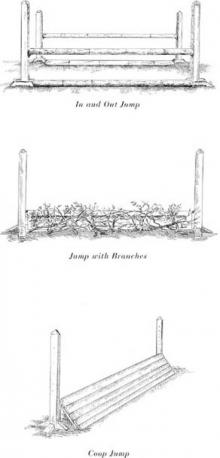 The Georges and the Jewels
The Georges and the Jewels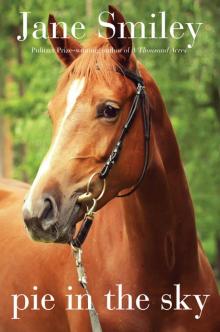 Pie in the Sky: Book Four of the Horses of Oak Valley Ranch
Pie in the Sky: Book Four of the Horses of Oak Valley Ranch Duplicate Keys
Duplicate Keys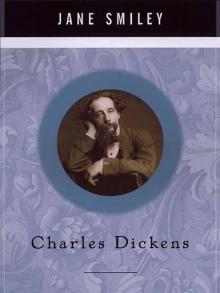 Charles Dickens
Charles Dickens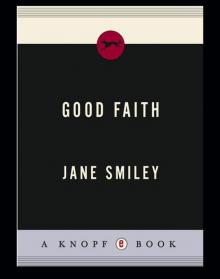 Good Faith
Good Faith Private Life
Private Life A Thousand Acres: A Novel
A Thousand Acres: A Novel The Greenlanders
The Greenlanders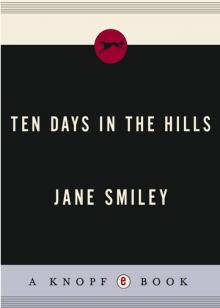 Ten Days in the Hills
Ten Days in the Hills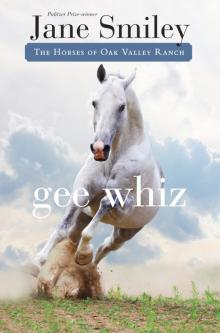 Gee Whiz: Book Five of the Horses of Oak Valley Ranch
Gee Whiz: Book Five of the Horses of Oak Valley Ranch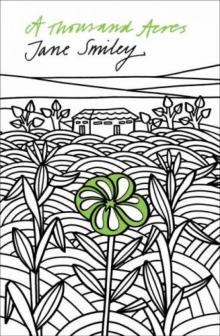 A Thousand Acres
A Thousand Acres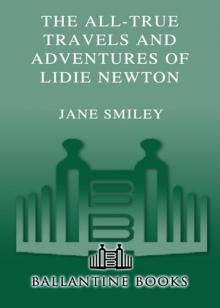 The All-True Travels and Adventures of Lidie Newton
The All-True Travels and Adventures of Lidie Newton Ordinary Love and Good Will
Ordinary Love and Good Will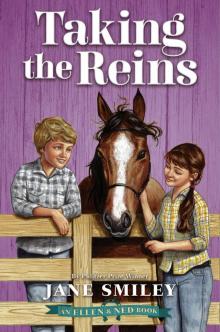 Taking the Reins (An Ellen & Ned Book)
Taking the Reins (An Ellen & Ned Book) The Man Who Invented the Computer
The Man Who Invented the Computer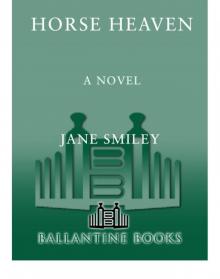 Horse Heaven
Horse Heaven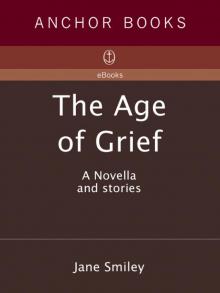 The Age of Grief
The Age of Grief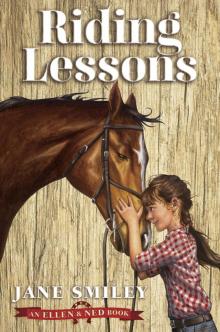 Riding Lessons
Riding Lessons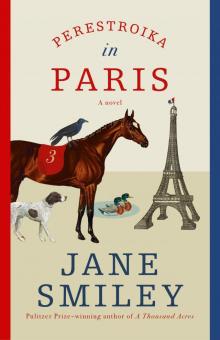 Perestroika in Paris
Perestroika in Paris A Good Horse: Book Two of the Horses of Oak Valley Ranch
A Good Horse: Book Two of the Horses of Oak Valley Ranch Saddles & Secrets (An Ellen & Ned Book)
Saddles & Secrets (An Ellen & Ned Book) Some Luck: A Novel
Some Luck: A Novel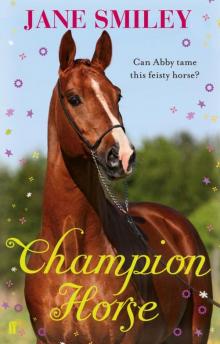 Champion Horse
Champion Horse Some Luck
Some Luck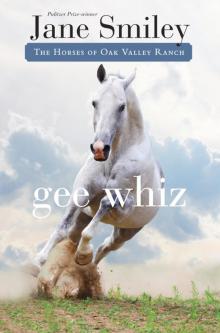 Gee Whiz
Gee Whiz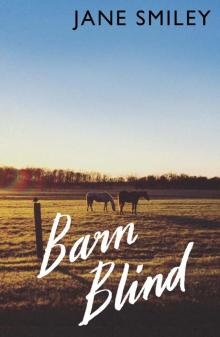 Barn Blind
Barn Blind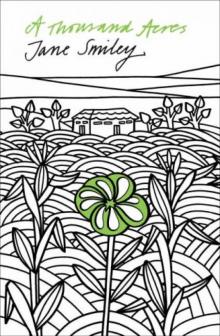 A Thousand Acres (1992 Pulitzer Prize)
A Thousand Acres (1992 Pulitzer Prize)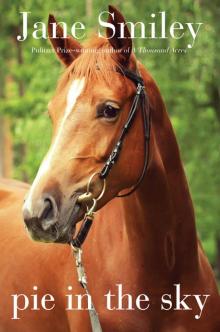 Pie in the Sky
Pie in the Sky True Blue
True Blue A Thousand Acres_A Novel
A Thousand Acres_A Novel A Good Horse
A Good Horse